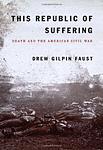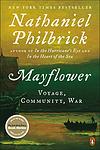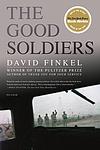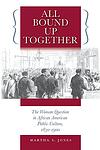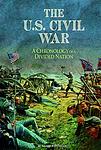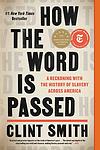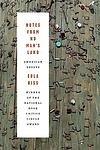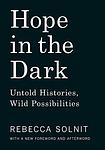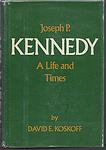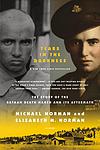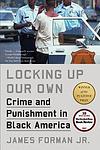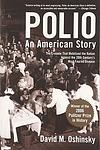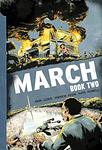The Greatest "Nonfiction, American History" Books Since 2000
Click to learn how this list is calculated.
This list represents a comprehensive and trusted collection of the greatest books. Developed through a specialized algorithm, it brings together 300 'best of' book lists to form a definitive guide to the world's most acclaimed books. For those interested in how these books are chosen, additional details can be found on the rankings page.
Genres
The "American History" category encompasses a broad range of books that delve into the events, figures, and forces that have shaped the United States from its pre-colonial days to the present. This genre includes works on pivotal moments such as the American Revolution, Civil War, and civil rights movements, as well as studies of political, social, and cultural developments across various eras. It covers biographies of influential leaders, analyses of policy changes, and examinations of societal shifts. Whether providing comprehensive overviews or focusing on specific incidents or decades, books in the American History category aim to illuminate the complexities of the nation's past, offering readers insights into the events that have defined the American experience and the context for its ongoing evolution.
Countries
Date Range
Reading Statistics
Click the button below to see how many of these books you've read!
Download
If you're interested in downloading this list as a CSV file for use in a spreadsheet application, you can easily do so by clicking the button below. Please note that to ensure a manageable file size and faster download, the CSV will include details for only the first 500 books.
Download-
26. This Republic of Suffering: Death and the American Civil War by Drew Gilpin Faust
This book examines how the Civil War's unprecedented death toll changed American society, politics, and culture. It explores how the nation grappled with the sheer mass of the dead, the logistics of their burial and mourning, and the profound impact on religious beliefs and practices. It also discusses how the war shaped the nation's understanding of life insurance, pensions, and the role of the federal government in citizens' lives. The book argues that the Civil War transformed how Americans understand death and the value of a human life.
-
27. Mayflower: A Story Of Courage, Community, And War by Nathaniel Philbrick
"Mayflower" by Nathaniel Philbrick is a historical account of the Pilgrims' journey to America on the Mayflower and their struggle to establish a colony in the New World. The book delves into the challenges they faced, including harsh weather, disease, and conflicts with the Native Americans. It also explores the relationships between the Pilgrims and the Wampanoag tribe, including the alliance formed between them and the events that led up to King Philip's War. Through detailed research and vivid storytelling, Philbrick provides a compelling and informative narrative of this pivotal period in American history.
-
28. The Nine: Inside The Secret World Of The Supreme by Jeffrey Toobin
"The Nine" by Jeffrey Toobin provides an in-depth look at the inner workings of the Supreme Court, focusing on the years between 2005 and 2007. Toobin explores the personalities, ideologies, and decisions of the nine justices who serve on America's highest court, including the contentious nominations of John Roberts and Samuel Alito. He also delves into landmark cases such as Bush v. Gore and the legalization of same-sex marriage. Through interviews with justices and their clerks, as well as extensive research, Toobin offers a fascinating glimpse into the secretive world of the Supreme Court.
-
29. Little Heathens: Hard Times And High Spirits On An Iowa Farm During The Great Depression. by Mildred Armstrong Kalish
"Little Heathens" is a memoir of Mildred Armstrong Kalish's childhood on an Iowa farm during the Great Depression. Kalish recounts the daily struggles and joys of life on the farm, from making do with limited resources to finding creative ways to entertain themselves. Through her vivid descriptions and humorous anecdotes, Kalish paints a picture of a resilient and close-knit community that persevered through tough times with a spirit of determination and optimism.
-
30. Killers Of The Flower Moon by David Grann
The book investigates a series of murders in the 1920s targeting the Osage Nation, whose members became immensely wealthy after oil was discovered beneath their land in Oklahoma. As the death toll climbed, the newly formed FBI took up the case and uncovered a chilling conspiracy. The narrative reveals the depths of corruption and the racial injustices that allowed the murderers to operate with impunity, shedding light on a largely forgotten chapter in American history where greed and prejudice led to the systemic exploitation and killing of Osage people.
-
31. The Dark Side by Jane Mayer
"The Dark Side" by Jane Mayer is a non-fiction book that explores the use of torture and other controversial tactics by the United States government in the aftermath of the 9/11 attacks. Mayer details the decision-making process behind the use of enhanced interrogation techniques, and the legal and ethical debates surrounding them. She also examines the impact of these tactics on the individuals who were subjected to them, as well as the broader implications for American democracy and human rights. The book draws on extensive research and interviews with key players in the Bush administration, as well as classified documents and memos.
-
32. The Good Soldiers by David Finkel
"The Good Soldiers" is a non-fiction book that follows the experiences of American soldiers during the Iraq War. The book focuses on the soldiers of the 2-16 Infantry Battalion and their deployment to Baghdad in 2007. Through the eyes of these soldiers, the author, David Finkel, provides a vivid and visceral account of the brutality and chaos of the war. The book explores the soldiers' experiences of combat, loss, and trauma, as well as the impact of the war on their families and loved ones back home. Overall, "The Good Soldiers" is a powerful and moving tribute to the bravery and sacrifice of American soldiers in Iraq.
-
33. All Bound Up Together by Martha S. Jones
The book explores the complex role of African American women in the suffrage movement in the United States, from the antebellum period through the ratification of the Nineteenth Amendment. It delves into the intersection of race and gender, examining how black women navigated societal constraints to advocate for their rights and the rights of their communities. The narrative highlights the contributions of these women to the broader women's rights movement while also confronting the racial discrimination they faced from white suffragists and the broader society. Through a detailed historical account, the book reveals the multifaceted strategies black women employed to fight for political inclusion and social justice.
-
34. Malcolm X: A Life of Reinvention by Manning Marable
This biography provides an in-depth exploration of Malcolm X's life, from his early days of crime and imprisonment to his transformation into one of the most influential African-American leaders. It delves into his complex relationships, his evolving political beliefs, and his controversial views on race and religion. The book also examines his assassination, shedding new light on the circumstances around his death and the conspiracy theories that followed.
-
35. Collapse by Jared Diamond
"Collapse" is an exploration of why certain societies throughout history have thrived while others have deteriorated and collapsed. The book delves into environmental problems, climate change, rapid population growth, and unwise political decisions as factors that contribute to the downfall of a civilization. The author uses examples from history such as the Mayans, the Vikings in Greenland, and modern examples like Rwanda and Haiti, to illustrate his points. It serves as both a historical analysis and a warning for modern societies to learn from the past in order to avoid a similar fate.
-
36. A World On Fire:Britain’s Crucial Role In The American Civil War by Amanda Kolpin, Amanda Peterson, Susan S. Wittman
"A World on Fire" is a comprehensive account of Britain's involvement in the American Civil War. The book explores the political, economic, and social factors that influenced Britain's decision to remain neutral, despite strong sympathies for the Confederacy. It also delves into the impact of the war on British society, including the role of British citizens in the conflict and the effects of the Union blockade on British trade. The authors provide a detailed and engaging narrative of this often-overlooked aspect of Civil War history.
-
37. How The Word Is Passed: A Reckoning With The History Of Slavery Across America by Clint Smith
"How The Word Is Passed" is a powerful and thought-provoking exploration of the legacy of slavery in America. Through a series of vivid and evocative essays, author Clint Smith takes readers on a journey across the United States, visiting sites that are deeply connected to the history of slavery and its aftermath. From Monticello to Angola Prison, Smith offers a nuanced and insightful look at the ways in which slavery has shaped our country and continues to impact our lives today. With a clear-eyed and compassionate approach, "How The Word Is Passed" is a must-read for anyone interested in understanding the complex and ongoing legacy of slavery in America.
-
38. Notes from No Man's Land: American Essays by Eula Biss
"Notes from No Man's Land: American Essays" is a collection of essays that explores the concept of race in America. The author uses personal experiences, historical events, and cultural analysis to examine the complexities of racial identity, privilege, and the often unacknowledged history of racial violence in the United States. The book also delves into the author's own struggles with her white identity and how it intersects with her experiences of living in predominantly black neighborhoods.
-
39. Hope in the Dark by Rebecca Solnit
"Hope in the Dark" is a powerful and inspiring exploration of the transformative power of hope in times of uncertainty. The book challenges the notion that hope is a passive emotion, instead arguing that it is an active process that can inspire change and action. Using a series of historical examples, the author demonstrates how hope has been a driving force in social and political movements, and encourages readers to remain hopeful, even in the face of seemingly insurmountable challenges.
-
40. A History of the World in 100 Objects by Neil MacGregor
This book offers a unique perspective on world history, telling the story of humanity through the examination of 100 man-made objects. The author, a museum director, uses items from the British Museum, ranging from a 2 million-year-old Olduvai stone cutting tool to a contemporary credit card, to explore various themes such as trade, religion, art, science, and politics. The book provides a fascinating lens through which to view the evolution of human civilization.
-
41. The Patriarch: The Remarkable Life And Turbulent Times Of Joseph P. Kennedy by David E. Koskoff
"The Patriarch" is a biography of Joseph P. Kennedy, the patriarch of the Kennedy family. The book covers Kennedy's life from his early days as a successful businessman to his political career, which included serving as the United States Ambassador to the United Kingdom during World War II. The author also delves into Kennedy's personal life, including his marriage to Rose Fitzgerald Kennedy and his relationships with his children, including President John F. Kennedy and Senator Robert F. Kennedy. The book explores Kennedy's successes and failures, as well as his controversial views on topics such as religion and race.
-
42. Tears in the Darkness by Michael Norman, Elizabeth M. Norman
This book provides a harrowing account of the Bataan Death March and its aftermath during World War II, focusing on the experiences of American soldiers captured by the Japanese in the Philippines. It centers on one young soldier's ordeal, offering a detailed narrative of his struggle for survival in the face of brutal captivity and the inhuman conditions of prisoner-of-war camps. The work is a testament to the resilience of the human spirit, as well as a sobering examination of the atrocities of war and the psychological scars borne by those who endure its worst cruelties.
-
43. The Words Of César Chávez by César Chávez
This book is a collection of speeches, essays, and reflections from a renowned labor leader and civil rights activist who dedicated his life to improving the working conditions and lives of agricultural workers. Through nonviolent tactics and powerful rhetoric, the author articulates his vision for social justice, emphasizing the importance of community, nonviolence, and the struggle for equality. His words offer insight into his philosophy and the principles that guided his efforts to organize farm workers, leading to significant advancements in labor rights and inspiring future generations of activists.
-
44. After The Music Stopped: The Financial Crisis, The Response, And The Work Ahead by Alan S. Blinder
After the Music Stopped is a comprehensive analysis of the 2008 financial crisis and its aftermath. Alan S. Blinder, a former vice chairman of the Federal Reserve, examines the causes of the crisis, the government's response to it, and the ongoing challenges facing the global economy. Blinder argues that the crisis was caused by a combination of factors, including lax regulation, excessive risk-taking, and a housing bubble. He also explores the various policy responses to the crisis, including the Troubled Asset Relief Program (TARP) and the Dodd-Frank Wall Street Reform and Consumer Protection Act. Finally, Blinder offers recommendations for preventing future financial crises and ensuring long-term economic stability.
-
45. Days Of Fire: Bush And Cheney In The White House by Peter Baker
"Days of Fire" is a comprehensive account of the presidency of George W. Bush and his vice president, Dick Cheney, during their eight years in the White House. Peter Baker, a journalist who covered the Bush administration for The New York Times, provides a detailed analysis of the key events and decisions that shaped their time in office, including the 9/11 attacks, the wars in Iraq and Afghanistan, Hurricane Katrina, and the financial crisis. Through interviews with key players and extensive research, Baker offers a nuanced portrait of two men who were both praised and vilified for their leadership and legacy.
-
46. The Great Influenza by John Barry
This book provides a comprehensive account of the 1918 flu pandemic, which is considered one of the deadliest in history, claiming the lives of an estimated 50 to 100 million people worldwide. The narrative delves into the origins and spread of the virus, the scientific and medical communities' struggle to understand and combat the disease, and the societal impacts of the pandemic. It also examines the role of government response, public health policies, and the effects on World War I. Through meticulous research, the book highlights the challenges of dealing with an unprecedented global health crisis and the lessons learned that are still relevant today.
-
47. Locking Up Our Own: Crime and Punishment in Black America by James Forman
This book delves into the complex and controversial issue of mass incarceration in the United States, particularly within the African American community. It explores the historical, social, and political factors that contributed to the high rates of black imprisonment. The author examines the role of African American leaders in advocating for tough-on-crime policies and their unintended consequences. The book is a thought-provoking analysis of the intersection of race, crime, and justice in America.
-
48. Polio: An American Story by David M. Oshinsky
This book provides a comprehensive history of the polio epidemic in America, highlighting the nationwide fear and panic it caused, and the subsequent race to find a cure. It chronicles the journey of scientific discovery, from the early days of the disease, through the development of the Salk and Sabin vaccines, to the eventual eradication of polio. The book also explores the role of politics, philanthropy, and public relations in the fight against polio, and the impact this had on modern medicine and society.
-
49. Cross Country by Robert Sullivan
The book is a vivid exploration of the United States through the lens of a road trip, delving into the history, culture, and diverse landscapes that define the American experience. The author embarks on a journey across the country, weaving personal anecdotes with historical narratives and interviews, capturing the essence of the American spirit. From bustling cities to quiet small towns, iconic highways to forgotten byways, the book paints a rich tapestry of the nation, reflecting on its complexities, contradictions, and the enduring allure of the open road.
-
50. March: Book Two by John Lewis
This graphic novel continues the memoir of a prominent civil rights leader, chronicling his commitment to nonviolent protest in the fight for racial equality in the United States. It delves into his personal experiences during the early 1960s, including his participation in the Freedom Rides, the historic 1963 March on Washington, and his leadership in the Student Nonviolent Coordinating Committee. The narrative captures the intensity of the movement, the confrontations with segregationist forces, and the internal struggles within the civil rights organizations, all set against the backdrop of the growing civil rights movement and the push for legislation that would eventually lead to the Voting Rights Act of 1965.
Reading Statistics
Click the button below to see how many of these books you've read!
Download
If you're interested in downloading this list as a CSV file for use in a spreadsheet application, you can easily do so by clicking the button below. Please note that to ensure a manageable file size and faster download, the CSV will include details for only the first 500 books.
Download